oUR women in conservation

As we celebrate Women’s Month, we are honored to highlight some of the powerful women within our organization, which is proudly women-led. These remarkable individuals are not only breaking barriers in the male-dominated field of conservation but are also leading critical initiatives to protect and preserve our planet’s most endangered species. Through their stories, we explore their journeys, the unique challenges they face, and their visions for a future where women continue to play a pivotal role in conservation. Join us in celebrating the exceptional women who are driving change and inspiring future generations.

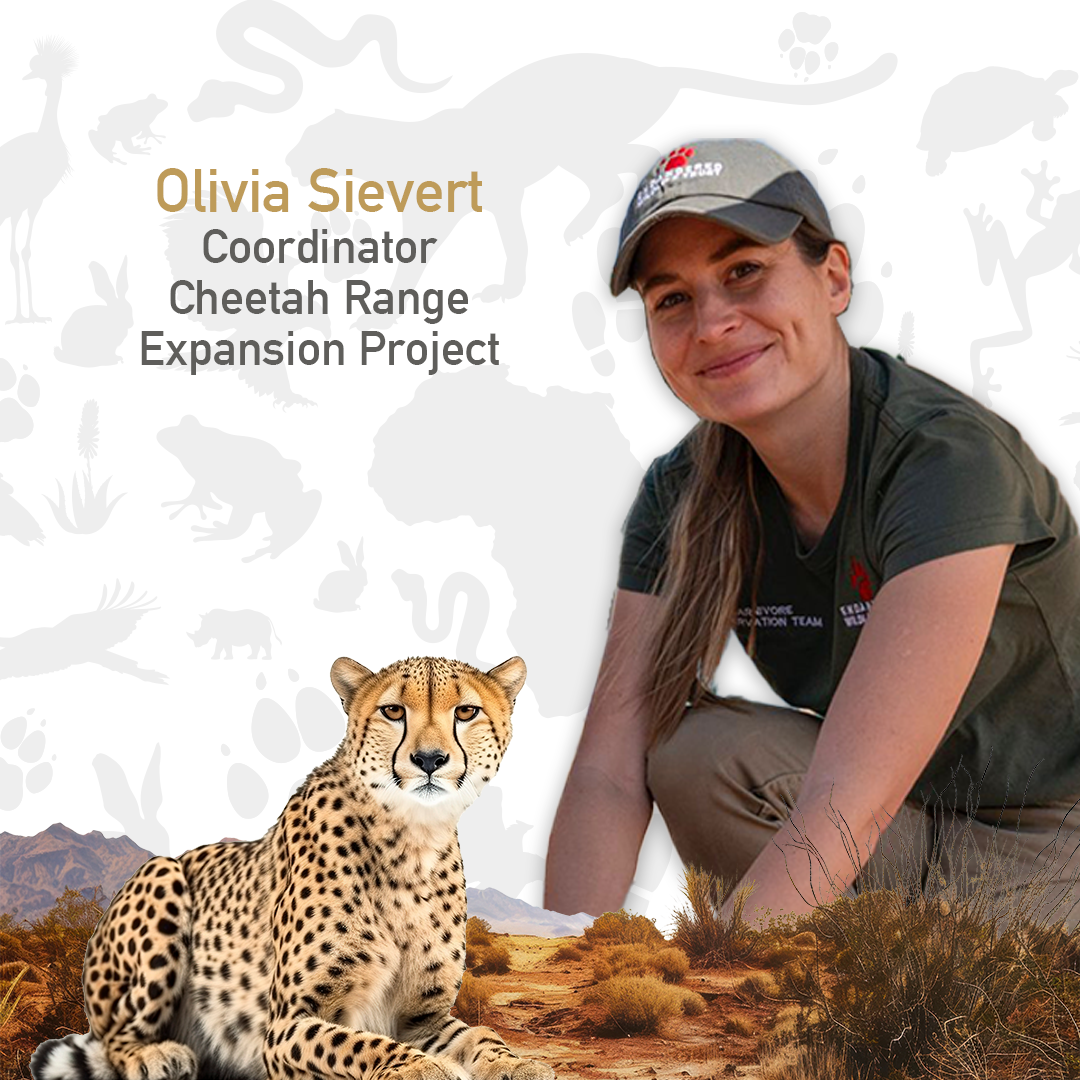
Olivia Sievert, Coordinator Cheetah Range Expansion Project
How did you come to be working with cheetah?
I came into it by chance, or by good luck. I had been working in Malawi for quite a few years on various different species and I always wanted to work with large carnivores and so when EWT in partnership with African Parks was reintroducing cheetah for the first time to Malawi in 2017 I was given the opportunity through the joint project to do the post-release monitoring of the cheetah released into the park, and that is kind of how my work with cheetah began.
Do you believe women face more challenges working in conservation given that it is considered a male dominated field?
I think it is definitely challenging being a woman working in a male-dominated industry especially if you are working remotely or in the parks which are very male dominated. I found it quite difficult at times because you end up getting a bit of a boys club and you can at times feel left out of new information that is coming on board and potential opportunities from there. So it can be a very difficult thing to navigate and it can be at time demotivating, but there are so many wonderful people out there in this industry who will support you and help lift you up through that.
Have you had any unusual experiences working in the field as a female conservationist?
Yes, I have definitely had a lot of difficulties on the job being a woman working in conservation, especially working in countries where women aren’t as respected, and that is unfortunately a cultural norm and they’re viewed more as caregivers than should be in the working force. There are certainly times when working in very rural communities where how you dress is going to dictate if people will even speak to you, let alone will listen to you and that can be a very difficult and frustrating thing to navigate.
What does the future hold for women in conservation?
It is nice. I am seeing more and more women come into conservation and I think it’s no longer a case of getting them interested at a school level necessarily – perhaps in rural areas it still very much is – but it is how do we retain women in conservation I think is the issue that we are facing now. How do we ensure that it remains an accessible career long-term to women. So I hope the future is very bright for women in conservation in order to be successful in conservation as an organisation we need to ensure that we have a diverse array of perspectives coming into it and that includes people of different cultures, religions, genders and so it is important that we look at how we can retain women in the field. That is at the moment one of our biggest hurdles, but I think certainly that there is a very bright future for women in conservation.

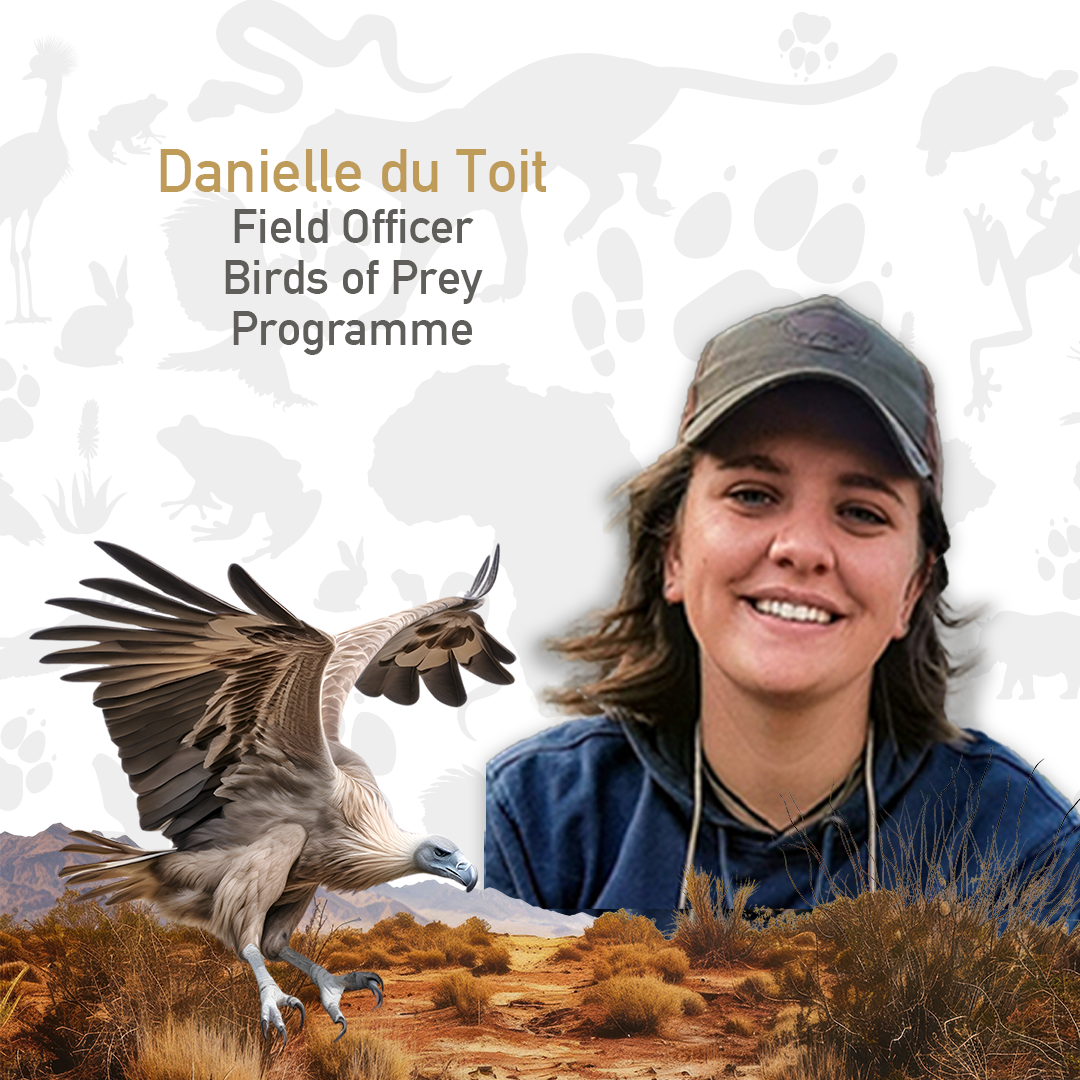
Danielle du Toit, Field Officer in the Birds of Prey Programme
Why did you choose vultures as a career?
Cliché answer is I never chose them, they kind of chose me, or the opportunity was so good that I couldn’t pass it up. I am from a community of Karoo farmers, my dad was a farmer so I always grew up outside and my dad was very good at instilling in my brother and I a healthy respect for our environment and a healthy respect for nature – the more we look after it, the more we will get looked after. So that’s was farming basically is – you have to look after the land and the ecosystems that support your livelihood and that is always something that I wanted to be involved in and then the farmers in our area wanted to get vultures back. We’d heard that there was a colony of Cape Vultures on our farm and it was always this dream of our group of farmers to bring Cape Vultures back to the Karoo and to fix a gap in the ecosystem. So I went to go study (my dad subsequently passed away) and while I was studying the EWT and the farmers had been chatting about a Vulture Safe Zone. And when I finished studying and came back to GRT and very good family friend told me…. this is something brilliant, apply for the intern position of the EWT. And Gareth very kindly offered me the position. I have been doing it ever since and I feel that it’s a legacy to my dad and so it really does. As I said: I didn’t choose it. It happened to me and I am very grateful for it ever since.
Is it not a challenge for a woman conservationist to be working in a largely male-dominated sector?
I am going to turn that on its head and say that it is actually a benefit to be a woman. Yes, I know there are different challenges that people face, but for me I think being a woman has afforded me the opportunity to be less threatening … It is less threatening for landowners to work with a woman than with a man. There is no competitiveness or anything like that so I am able to work very nicely with landowners and communities because as much as I am working for vulture conservation I’m working with people and that has helped a lot.
Have you had any challenges doing your job ie. men not listen to you because you are a woman?
I would say that is not a challenge, because men in communities and people in general do listen to us. I think it has a lot to do with the fact that we wear the red (paw). EWT has got such a good standing with so many people and it such a reputable organisation that it helps a lot, whether I am a man or a woman or whatever, the fact that I am representing the EWT that is a big thanks to our predecessors for building such a relationship with the people we work with, that they don’t see your agenda or the fact that you are a man or a woman. They actually just see the red paw.
I think there are other challenges. I drive a lot and often alone in fairly remote areas, but again I am lucky that I was raised by a father who made sure that I can handle myself, that I can deal with pretty much any situation. But I think the challenge is more to do with who you are as a person and your agenda. You’ve got to be tough and be able to handle yourself in situations without losing your head. I think the challenges that I have had have had very little to do with the fact that I am a women and more to do with life in general.
How do you see the future for females in conservation?
I think it is very bright and I say that not because women are becoming more involved in conservation. I think in itself conservation is becoming a much more open field for anyone of any background to play a role and to contribute to conservation. I think because we need accountants, we need lawyers, we need writers, we need technicians, IT people, community specialists – people from every walk of life can contribute to conservation. I think that not only is conservation itself – field work, research and monitoring etc – becoming a more open field to women, and that is thanks to our predecessors who made a seat at the table, not asked for one, but made that seat at the table, but it is also becoming a much more open space for everyone to contribute. I think that women are going to dominate the world one day – we are already doing it, but quietly – but I think it is really going to be amazing for women and I can’t wait to be involved.
I strongly believe that it is a slap in the face of women who have been working in conservation throughout history to still sit back and say it’s so hard because I am a woman, because they have worked so hard for that respect and for the place we have at our own table. I don’t think the challenge is being a woman. I think the challenge is conservation and making sure that that happens.

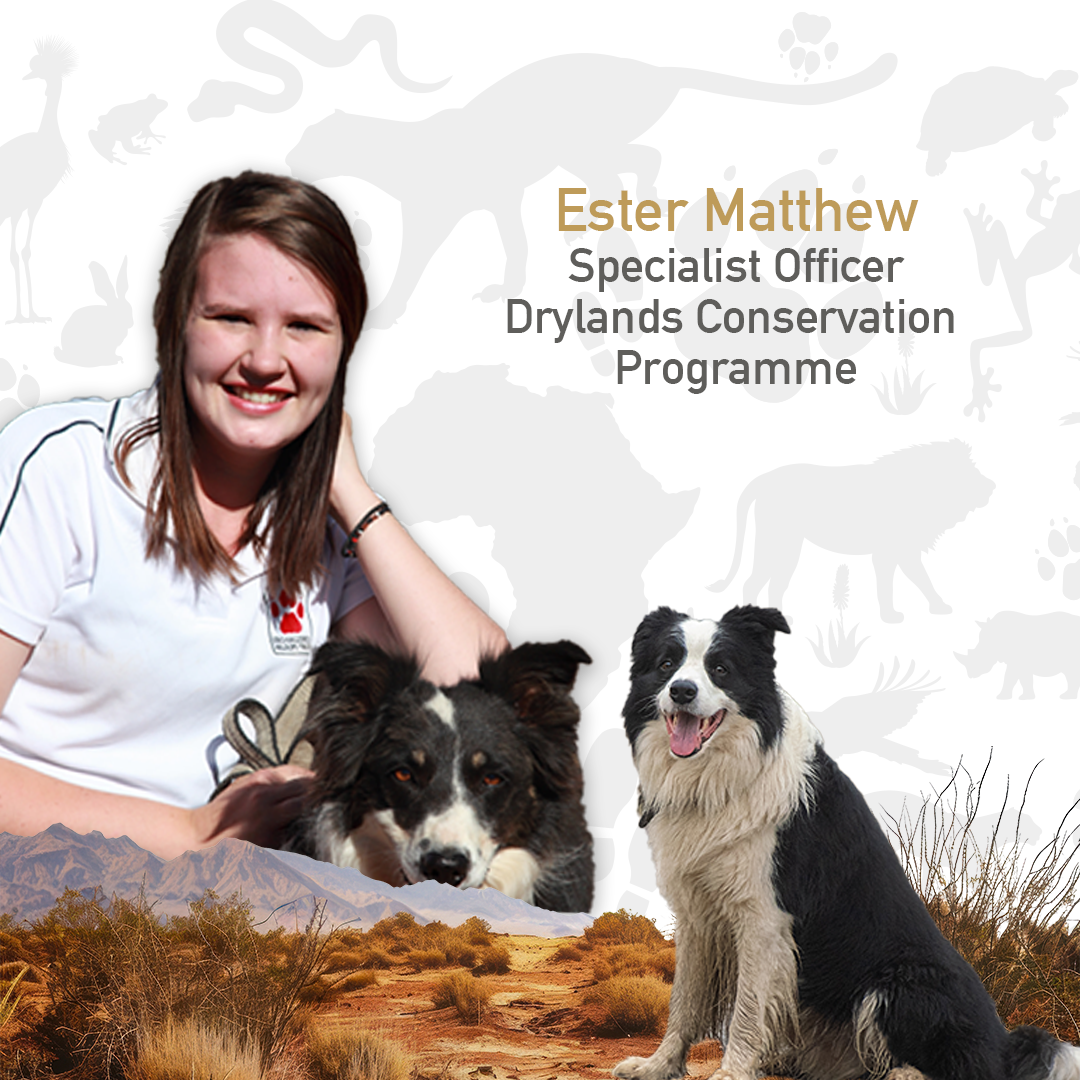
Ester Matthew, Specialist Officer in the Drylands Conservation Programme
Why did you choose conservation as a career?
The reason why I chose conservation as a career is because from a young age I was fascinated by all living creatures, especially domestic dogs and wildlife so it was inevitable that my school subjects and what I would study would be focused around conservation science and conservation aspects. With this I pursued a career in conservation and knowing about the EWT before starting my work career I was already interested in the organisation and when opportunities became available I applied and was very grateful to get a foot in the door.
Challenges of being a women in conservation?
It was a lot more challenging for a women to get a career in conservation. However, I think things are changing and more opportunities are becoming available for women in conservation and that is really due to our strong women who have laid the path for younger women like me, making it a lot easier to get a foot in the door or an opportunity that maybe wasn’t available a couple of years ago. And I think the industry is shifting in a way where it is not necessarily male dominated anymore and where only certain aspects are male dominated, such as anti-poaching and ranger work can be more male dominated where the research and conservation planning side, almost the science side is becoming more female dominated from what we have seen over the last couple of years.
I was in a very fortunate position to work alongside a very strong-willed female conservationist and also having a male mentor that was open to new ideas and actually created opportunities for me to succeed in this field, and for that I will always be grateful.
As with all previously male dominated fields, I think there will always be challenges in some aspects for women. However, I have also seen the benefit of being a female on conservation where in certain cases we would get better results just because we are more approachable and soft natured which sometimes gives us the benefit. In other cases, not.
What does the future hold for women in conservation?
I think the future for females in conservation holds a wide open space of new opportunities and places to have an impact and that people like, for example, Jane Goodall who’s pathed the way and opened more opportunities for females, will make it possible for us to have an even large impact going forward.
Protecting endangered and elusive species such as Riverine Rabbits, golden moles and dwarf tortoises, to name a few, has been an absolutely amazing experience and using scent detection dogs as part of my work has been an extra rewarding factor.

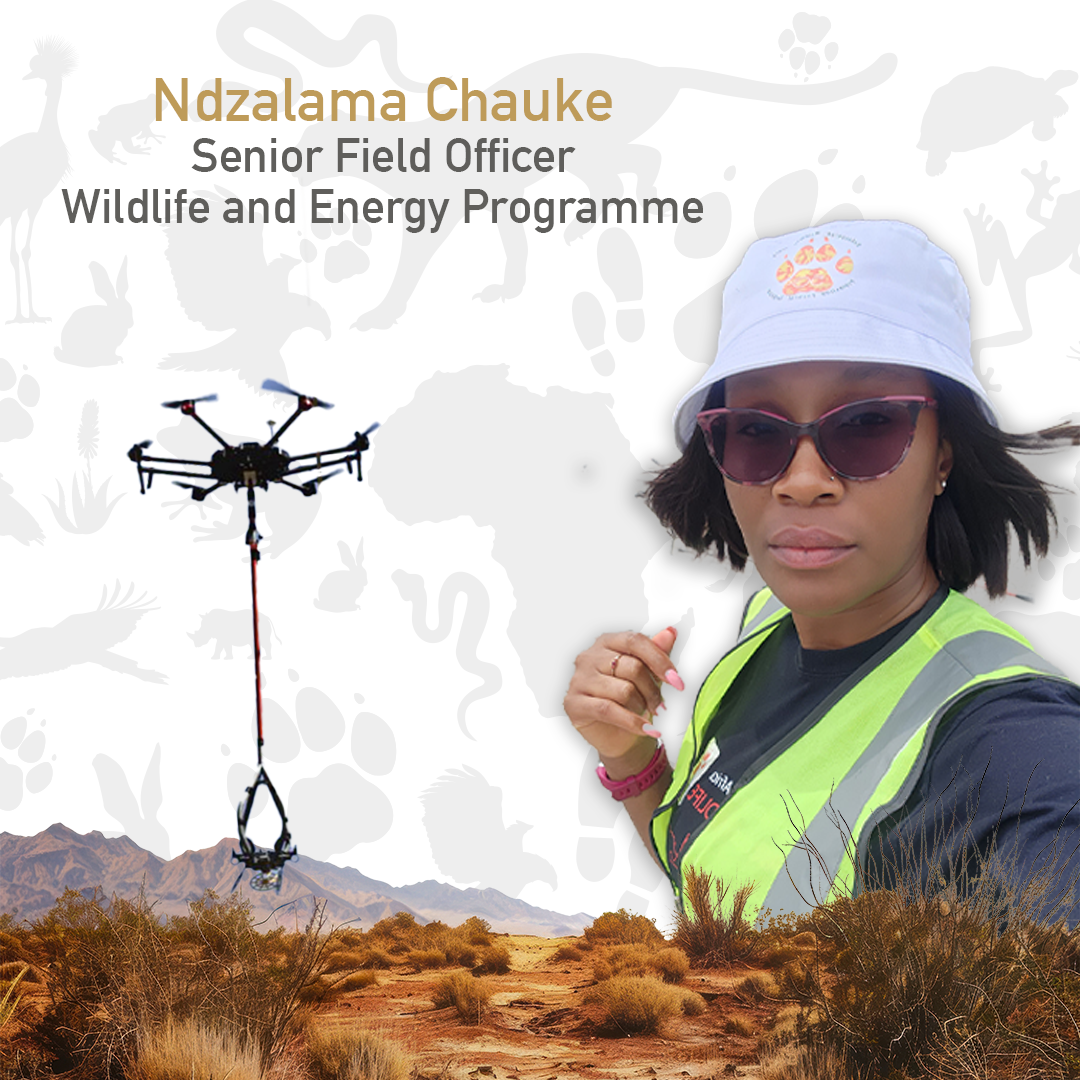
Ndzalama Chauke, Senior Field Officer in the Wildlife and Energy Programme
From Malamulele in Limpopo – Studied nature conservation
How did you get into nature conservation?
What motivated me was my cousin. He studied nature conservation and school holidays he would come home and he would tell us a whole of stories especially when he was doing his training and he would travel to KNP and as young girl who grew up in rural areas there was not much info about conservation. As much as for me KNP was an hour 30 min from home and I only started going to the KNP now. I had never been to the KNP. I think he kind of instilled in me and taught me a lot as a young woman about conservation and he motivated me to study nature conservation and as a young woman I always wanted to experience the stories that he would tell us and also to encourage young girls or young in rural communities that there is a lot in studying nature conservation and that there is more to choosing nature conservation as a career to being a field ranger. Because then studing nature conservation was you have to be a ranger so we were not exposed to what I am exposed to right now. I remember in my last years of studying nature conservation and I was introduced to the EWT was when I realized that studying nature conservation was not just about working in a nture reserve and being a ranger, there is a lot of integration going on. The EWT, for example, offers a lot. Like being out in the field, and then there is the research department, there is a lot that one can explore and integrate and conserve in our environment and our species.
Did you choose a specific field of nature conservation, or a species that you wanted to work with?
No. I joined the EWTs Conservation Leadership Programme and they were helping young conservation students to do their projects, which was very helpful for me because I got to know a lot more and fall in love with trees and grasses and vegetation surveying. But, when I joined the EWT I was exposed to a whole of the programmes, which meant I could explore and I could learn more. So when I joined the EWT I was with the skills development programme, which was environmental education. So it was more about doing training with SAPS officials, or nature conservation officials, on environmental awareness on cycads. So I worked with the late Adam Perez, who was my mentor. And then when Ashleigh joined we would travel together and do the training together.
My career has opened a number of opportunities and I have learned and experienced a lot. But, for now I am a young woman who still want to experience a lot, who wants to learn more from my colleagues and about the other programmes.
Have you had any challenges working in a largely male-dominated environment?
Not really. Where I am now in the Wildlife and Energy Programme, the plan was for me to travel quite a bit, but I find myself behind my laptop a lot. So I have never experienced a situation where this is a man’s world or that my work is an exception for women. Personally, I have never. With the Eskom guys I have formed this great relationship. I think another thing is because I am that young woman behind a laptop who is always doing a lot they were always eager to meet this Ndzalama. I remember I went to this environmental conference in June. I think the first day there were so many people from Eskom going into our stand and they were asking about me. And the following day they were like we’ve always wanted to meet you so we can put a face to the person who we speak to emails and the telephone etc, because of area that I work in. Because I have formed these great relationships, I have never personally experienced any issues or felt like I don’t belong here.
Have you had any unusual experiences at all?
Not really.
But, there was this one time when Amos and I were travelling to Delmas. We had a situation where we had to trap a porcupine because they were digging under an Eskom tower and we were asked to go and assist. So we were travelling there and our car broke along the way and I am a young women – I think then I was the only woman in the Wildlife and Energy Programme – but luckily Amos was there and we were able to sort it out. (Lourens was worried because he was saying I might have been travelling alone)
Since then Lourens has been very protective and he won’t let me travel alone in case the car breaks down. But, I had just started then. Now I am a grown woman, and I understand his concern because Tamsen and I are the only women in the programme so the guys are very protective of us, especially when we have to travel on our own. One of them always travels with us.
Future of conservation for young women in SA?
There is a future. There is a lot that we can do as women, or young women, in the conservation sector in South Africa. When I look at a woman like Barbara Creecy, I mean she had done a lot for the conservation sector in her time and also look at Yolan, our CEO, there is a lot. I mean the organisation is a very successful organisation because of the like of her. There is a lot of women that we can look up to. And it is important for women in rural communities who want to pursue a career in nature conservation. There is a lot we can do in our communities where we can bring information and say there are the things we can do, and these are the things that we cannot do because we rely on these endangered species. We need to look at our economy as well, because if we do not have these things (species), then what is South Africa without the Big Five? So I try when I am back home where some of the young women are very fascinated by what I do, to give them information because there is a lack of information about nature conservation and the work you can do in the sector, not just in a nature reserve. There is a lot that you can do. You can even integrate GIS into conservation. So I try because a lot of young women get fascinated by the fact that I am a very young woman, a modern young woman, and I am in the conservation sector.
Because of their questions about what I do, and how I do it, I am able to take them through the work that the Endangered Wildlife Trust does. So I see a great future, and great potential for young women, honestly.
I am so proud of our Eco-schools programme where we have integrated nature conservation in the curriculum for children. It is very important that we educate our kids about conservation and nature.

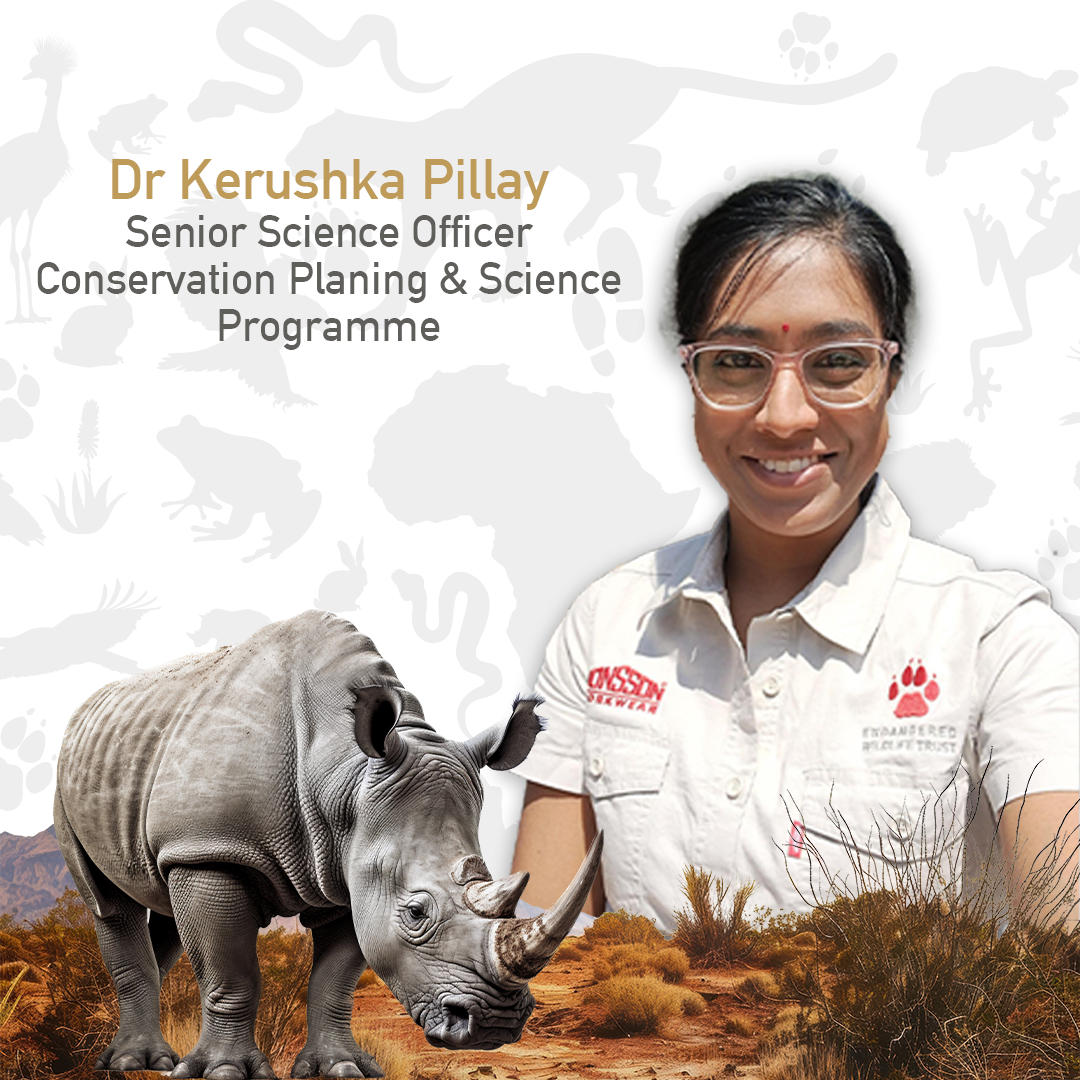
Dr Kerushka Pillay, Senior Science Officer for the Conservation Planning and Science Unit
I studied for a BSc in environmental science and so I went to work at the KZN Science Centre as an education officer. During that time I realized I love education but there is still like a longing or a missing feeling that I can do more. So then I ended up going to the University of KwaZulu-Natal Pietermaritzburg campus where I found an amazing supervisor Prof Colleen Downs and she is the one who, so under her lab I got involved in ecology and conservation science. Do I did my Honours, my Masters and my PhD in Ecological Sciences. Because she’s a zoologist, ornithologist, she worked with lots of birds and small mammals and somehow I started working with the Cape Porcupine and then I worked with feral cats in an urban area and then Vervet Monkeys. So my background is small mammal ecology and how urbanization impacts and affects their population and how human-wildlife conflict stems from these populations of wildlife that are in urban areas and how we need to strike that balance in order to live together.
What made you decide to study environmental sciences?
So my background stems from my mum and dad. My mum was a natural science teacher and my dad was just this crazy bundu bashing Indian man who likes camping and being outside. So between my mum and my dad they introduced us to going to museums and going for walks. You know Wessa used to have eco-schools and rocky shores and hiking so they pushed us to get into nature and into conservation. So my parents encouraged us to be one with nature and that is where that love and passion came from.
Did your siblings also go into an environmental field?
No, I am the one who fell in love with nature and the bush. I just live animals and I want to do something for them because they don’t have a voice. But, I did not want to do it like a tree hugger, bunny hugger type. I wanted to do it from a scientific perspective and use facts and evidence to rule out questions and do hypothesis testing. So that part stems from my mum being a natural science teacher.
You’re more on the scientific side than in the field, but is this not also more of a man’s world that you have entered?
I think in South Africa in the last 10 years there has been this sudden shift from male-dominated to female. And because of my supervisor, she was very women empowering in the conservation and the science field. So even if there are men, there is a huge amount of women that are setting the groundwork and the path for scientific research with animals and in conservation. Look at our organisation as well where we had Harriet (Davies-Mostert) working with us, even Sam (Mynhardt) with the lions – there is quite a bit of females. Even Jeanne Tarrant with the frogs. So there are quite a bit of females around us that I think there is a shift in the past 10 years.
Have you worked in the field?
I worked in the field with the Wildlife in Trade Programme’s cycad project.
Did you find it challenging being a woman in the field?
Yes, they did. They look at you like ‘oh, is this person going to handle it?’ Is this person fit enough to do the hard field work. But, even while I was at the (UKZN) campus I used to drive a bakkie (a small NP200) and when I stepped out the vehicle they would go ‘oh, is this the researcher?’
But once you start to talk and you show them the tracks and how you work then they are only convinced. Even when I worked in Modderfontein I used to go with my bakkie and they would go ‘oh this thin little person is coming’ but once I start getting into it and they see I can handle a spade, I can handle a 4×4, then men start taking you seriously. So they have to see. It is a perception. What they see is not what they get. So it is only after what they see then only they can believe your strengths.
Do you find that because of cultural differences that men don’t always want to listen to a woman telling them what to do?
Yes, you do get the very strong assertive men not willing to listen to you, like businessmen. When I worked at Modderfontein I used to sit on their board, not necessarily the language. It was the men who were authorative, they just shut your voice down and that was more about ‘we need to make money so we close this down because there is no benefit to any of us. We don’t need it and that’s it and that’s final’.
What does the future look like for women in conservation?
I think in conservation in general it is good. I feel that in the whole spectrum of things, conservation and females, it is still quite small. There is still a lot that we have to learn about the environment and learn about bringing a social aspect into it and I find that females now – and it also has to do with the shift in time and communication and social media that women are now want the quick way out of being influencers, but influencing in the right space of conservation and animal science and science, but they are doing more like fashion and beauty and is that really what we want to focus on?
(Shows women as being shallow).
But, the women that are going into it and are using social media and the internet to their advantage and empowering other women, even like women through sustainability, those women are going to be impactful.

